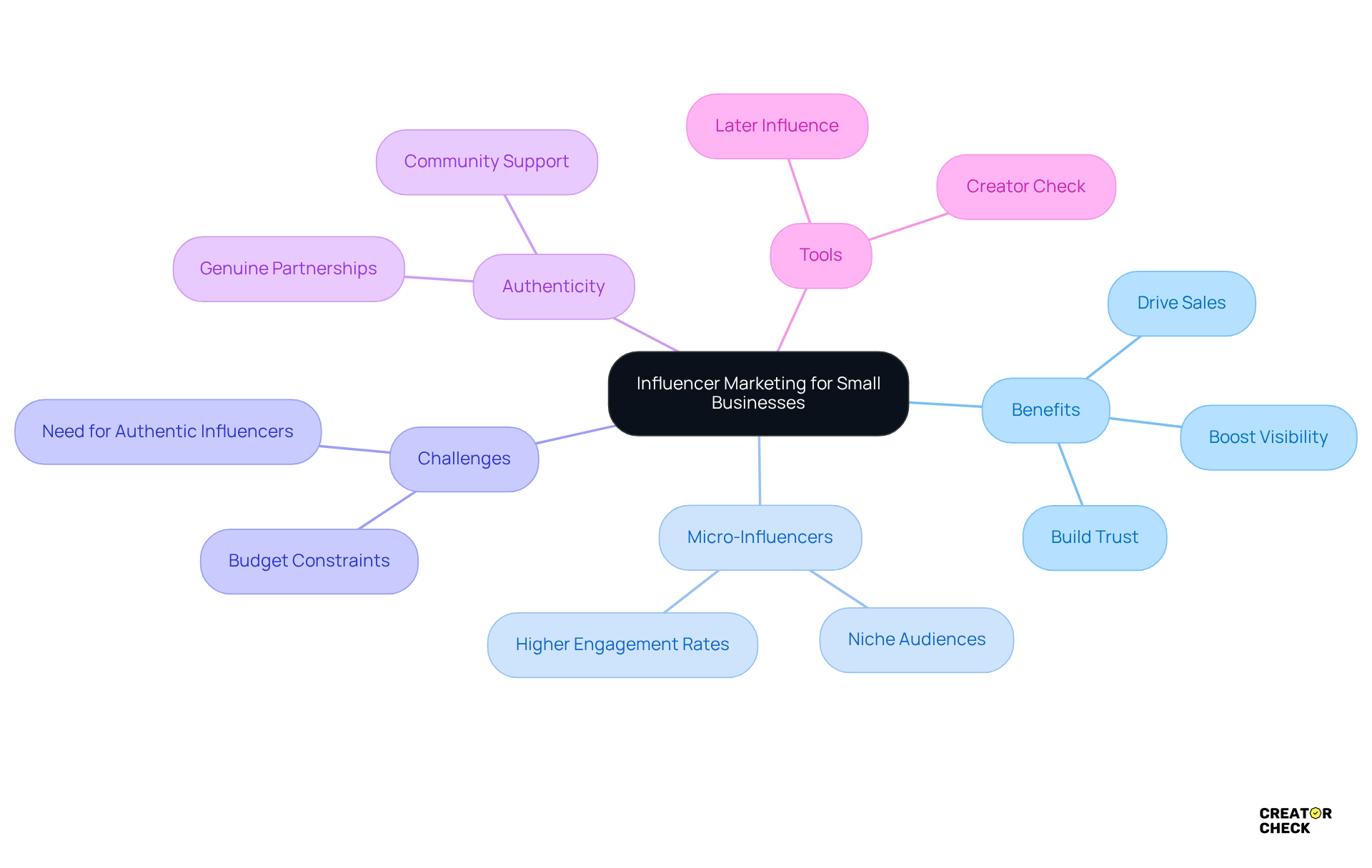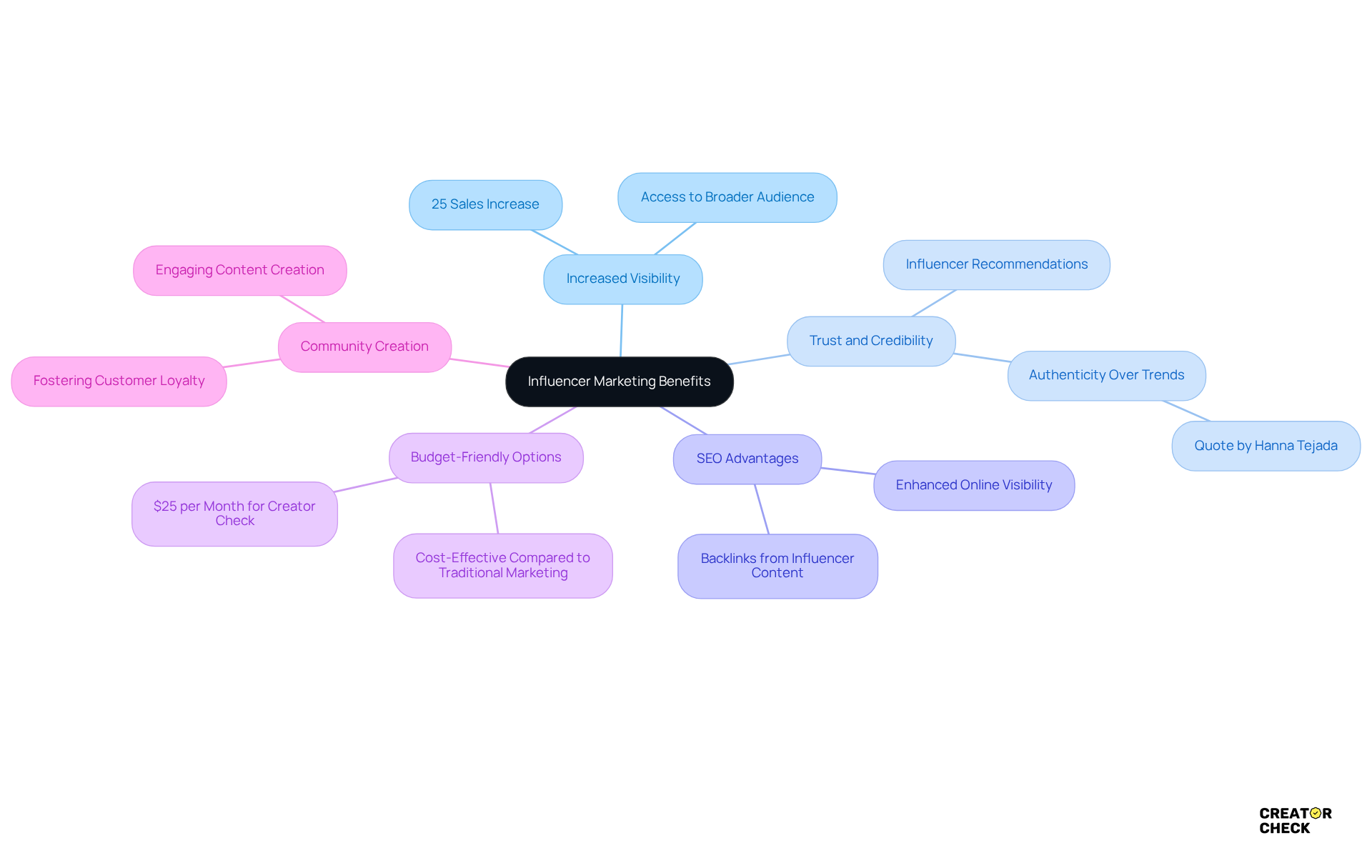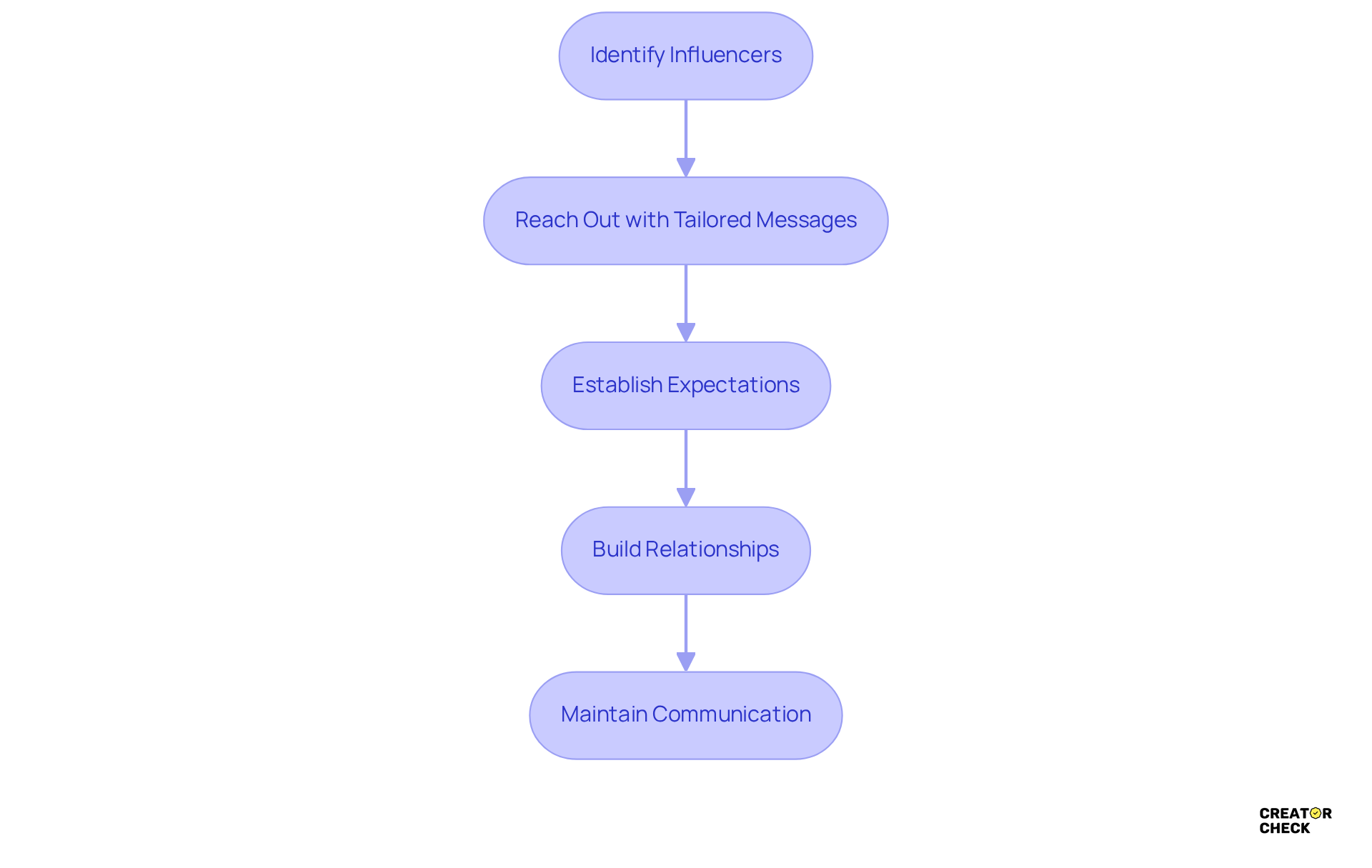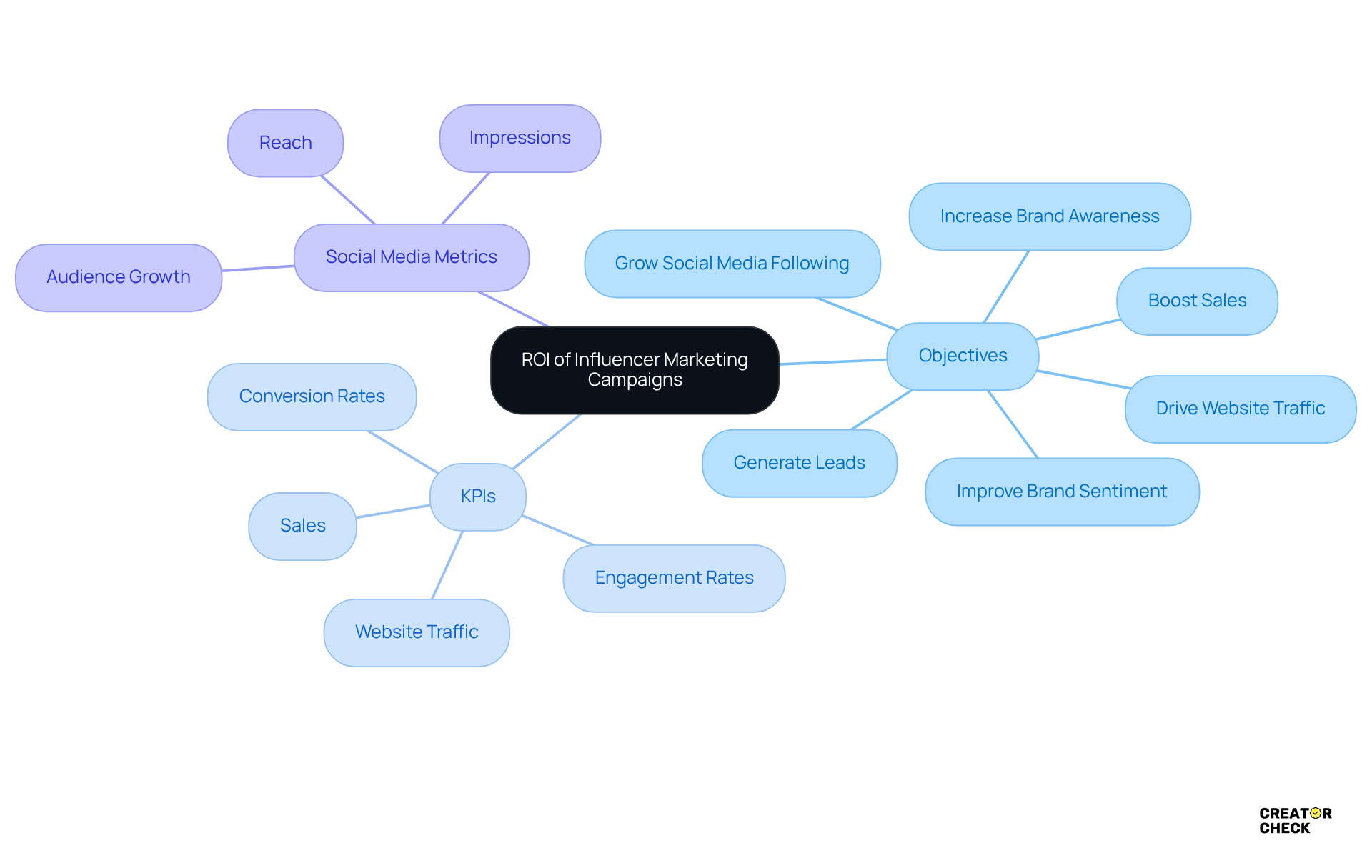Overview
So, what are the four key strategies for influencer marketing success that small businesses can really get behind?
- Selecting the right influencers: You want to team up with folks who truly resonate with your brand.
- Establishing clear collaboration expectations: Everyone should know what’s on the table.
- Leveraging micro-influencers: They bring authenticity that can really connect with your audience.
- Measuring campaign ROI effectively: This is a must to see what’s working.
These strategies not only help small businesses enhance visibility but also build trust with consumers. Plus, tracking the effectiveness of your marketing efforts means you can drive sales and foster community engagement. It’s all about creating those meaningful connections, right? So, how will you implement these strategies in your own marketing efforts?
Introduction
Influencer marketing has become a game-changer for small businesses looking to boost their visibility and connect authentically with consumers. By teaming up with social media personalities, these businesses can tap into established audiences without the hefty price tag of traditional advertising.
But here's the kicker: navigating the influencer landscape comes with its own set of challenges. How can small enterprises choose the right influencers and effectively measure the success of their campaigns?
In this article, we’ll explore four key strategies that empower small businesses to make the most of influencer marketing. This way, they can not only stand out in a crowded marketplace but also build lasting relationships with their customers.
So, let’s dive in and see how you can harness this powerful tool!
Define Influencer Marketing and Its Importance for Small Businesses
Influencer marketing is all about teaming up with folks who have a big following on social media to help promote your products or services. This strategy of influencer marketing small business is especially beneficial for smaller businesses because it allows them to tap into established audiences without the hefty price tag that comes with traditional advertising. By implementing influencer marketing small business strategies and partnering with influencers who really connect with their target audience, these businesses can significantly boost their visibility, build trust, and ultimately drive sales. It’s a game changer in competitive markets, leveraging the authenticity and reach of influencers to fuel growth.
So, what’s the deal with micro-influencers? Well, they often have higher engagement rates, making them particularly effective for lesser-known companies. This means they can connect with niche audiences and foster genuine relationships. In fact, statistics show that companies using influencer marketing can see a return of up to $5.78 for every dollar spent—pretty impressive, right? Brands like Nikin Clothing have run successful campaigns that highlight the potential for substantial engagement and sales growth, proving just how relevant influencer partnerships are for emerging businesses.
However, smaller enterprises do face some hurdles in influencer marketing small business, like budget constraints and the need for affordable collaborations. It’s crucial for these companies to choose influencers who genuinely support their products, as authenticity is key to maintaining trust. Plus, setting clear marketing goals for influencer marketing small business campaigns can effectively help tailor their strategies.
And here’s a fun fact: 70% of shoppers prefer to support companies that show they care about their communities. This really underscores the importance of building authentic connections with influencers. To make the whole process smoother, tools like Creator Check can help agencies manage their operations better, ensuring email security and data privacy through top-notch encryption. This way, agencies can efficiently handle multiple inboxes and focus on securing those all-important partnerships.

Identify Key Benefits of Influencer Marketing for Small Business Growth
Influencer marketing small business provides numerous benefits, particularly in enhancing visibility. By tapping into a well-known individual's established follower base, companies can reach a broader audience, which is super important for growth in 2025. Did you know that major eCommerce brands have seen a 25% increase in sales through influencer-generated affiliate links? That really highlights how effective this strategy can be!
Plus, marketing through social media personalities helps build trust and credibility. Consumers are way more likely to buy products backed by people they admire. This trust is even stronger when working with micro-influencers, who often charge less but have highly engaged audiences. Their genuine connections with followers can lead to better conversion rates compared to traditional advertising methods. As Hanna Tejada puts it, "customers now prioritize trust over trends," which really underscores the importance of authenticity in marketing with social media personalities.
So, what does this mean for you? Well, partnerships with social media figures can also boost your search engine optimization (SEO) through backlinks created from their content, further enhancing your online visibility. This is crucial for small businesses utilizing influencer marketing small business to stand out in a crowded digital landscape.
Moreover, influencer marketing small business can be a budget-friendly option. Just think about platforms like Creator Check, which offers services for only $25 a month per inbox. Creator Check simplifies management by letting agencies handle multiple inboxes from different providers, while also ensuring data privacy and security with top-notch encryption and compliance with GDPR and other data protection standards. This makes it super accessible for agencies managing multiple creators while keeping sensitive information safe.
Ultimately, teaming up with social media personalities can create a sense of community around your product, fostering customer loyalty and encouraging repeat transactions. By crafting engaging content that resonates with their audience, influencers help businesses build lasting relationships with consumers, driving sustained growth. Just remember, it’s essential to secure content usage rights and ensure that the influencer’s niche aligns with your target audience to avoid any potential pitfalls.

Implement Effective Strategies for Collaborating with Influencers
To effectively collaborate with influencers, lesser-known enterprises should start by engaging in influencer marketing small business and finding influencers who share their brand values. You can do this by diving into social media research, using tools to check engagement rates, and looking at audience demographics. Once you've spotted potential influencers, reach out with tailored messages that clearly outline your collaboration goals and the benefits for both sides.
So, let’s talk about expectations. It’s super important to establish these from the get-go. This means discussing content guidelines, timelines, and compensation right off the bat. Plus, building a genuine relationship with influencers in influencer marketing small business can lead to more authentic promotions. Regular communication and feedback can help keep the partnership positive, ensuring that both parties reap the rewards of the collaboration.
Remember, it’s all about creating a win-win situation!

Measure and Analyze the ROI of Influencer Marketing Campaigns
To really get a handle on the ROI of your marketing campaigns, small businesses should kick things off by setting clear objectives before diving into their initiatives. What should you keep an eye on? Key performance indicators (KPIs) like:
- Engagement rates
- Website traffic
- Conversion rates
- Sales that can be traced back to your promotional efforts
are essential. Using tracking tools—think unique discount codes and dedicated landing pages—can seriously boost your ability to link sales to specific promotions.
And don’t forget about social media metrics! Metrics like:
- Reach
- Impressions
- Audience growth
can provide you with valuable insights into the buzz created through partnerships with social media personalities. By regularly checking these metrics, you’re not just fine-tuning your strategies; you’re also ensuring that your marketing efforts yield a solid return on investment.
For example, did you know that brands using shoppable video technology sell 3.4 times more than those that don’t? That really highlights how crucial effective tracking and engagement strategies are. By honing in on these KPIs and using strong tracking methods, small businesses can significantly enhance their influencer marketing small business campaigns and drive greater success.

Conclusion
Influencer marketing is really shaking things up for small businesses! It allows them to connect with a broader audience and boost brand visibility without the hefty price tag of traditional advertising. By tapping into the authenticity and reach of influencers—especially micro-influencers—small enterprises can build real relationships with potential customers, which ultimately drives sales and growth. This strategy not only increases visibility but also fosters trust, a key ingredient for cultivating customer loyalty in today’s competitive markets.
So, what’s the takeaway? It’s crucial to choose the right influencers who resonate with your brand values and target audience. Setting clear expectations and keeping communication open can lead to successful collaborations, ensuring that both sides gain from the partnership. Plus, tracking your return on investment with specific KPIs and tools is essential for gauging the success of your influencer marketing campaigns. This way, small businesses can fine-tune their strategies for even better results.
Ultimately, embracing influencer marketing goes beyond just promoting products; it’s about building authentic connections and communities around your brand. Small businesses should definitely look into this dynamic approach, adapt to new trends, and invest in meaningful partnerships that truly resonate with their audience. By doing so, they can tap into the full potential of influencer marketing, gaining a competitive edge and achieving lasting growth in an ever-evolving digital landscape.
Frequently Asked Questions
What is influencer marketing?
Influencer marketing involves collaborating with individuals who have a significant following on social media to promote products or services.
Why is influencer marketing important for small businesses?
Influencer marketing is particularly beneficial for small businesses as it allows them to reach established audiences without the high costs associated with traditional advertising, boosting visibility, building trust, and driving sales.
What are micro-influencers and why are they effective?
Micro-influencers are individuals with smaller but highly engaged followings. They are effective for lesser-known companies because they can connect with niche audiences and foster genuine relationships.
What is the potential return on investment for influencer marketing?
Companies using influencer marketing can see a return of up to $5.78 for every dollar spent.
What challenges do small businesses face in influencer marketing?
Small businesses often face budget constraints and the need for affordable collaborations, making it crucial to choose influencers who genuinely support their products.
How can small businesses ensure authenticity in influencer partnerships?
It is important for small businesses to partner with influencers who authentically connect with their products, as authenticity is key to maintaining trust.
What role do marketing goals play in influencer marketing strategies?
Setting clear marketing goals for influencer marketing campaigns helps small businesses tailor their strategies effectively.
What percentage of shoppers prefer to support companies that care about their communities?
70% of shoppers prefer to support companies that demonstrate care for their communities.
What tools can assist agencies in managing influencer marketing operations?
Tools like Creator Check can help agencies manage their operations better, ensuring email security and data privacy through encryption while efficiently handling multiple inboxes.




